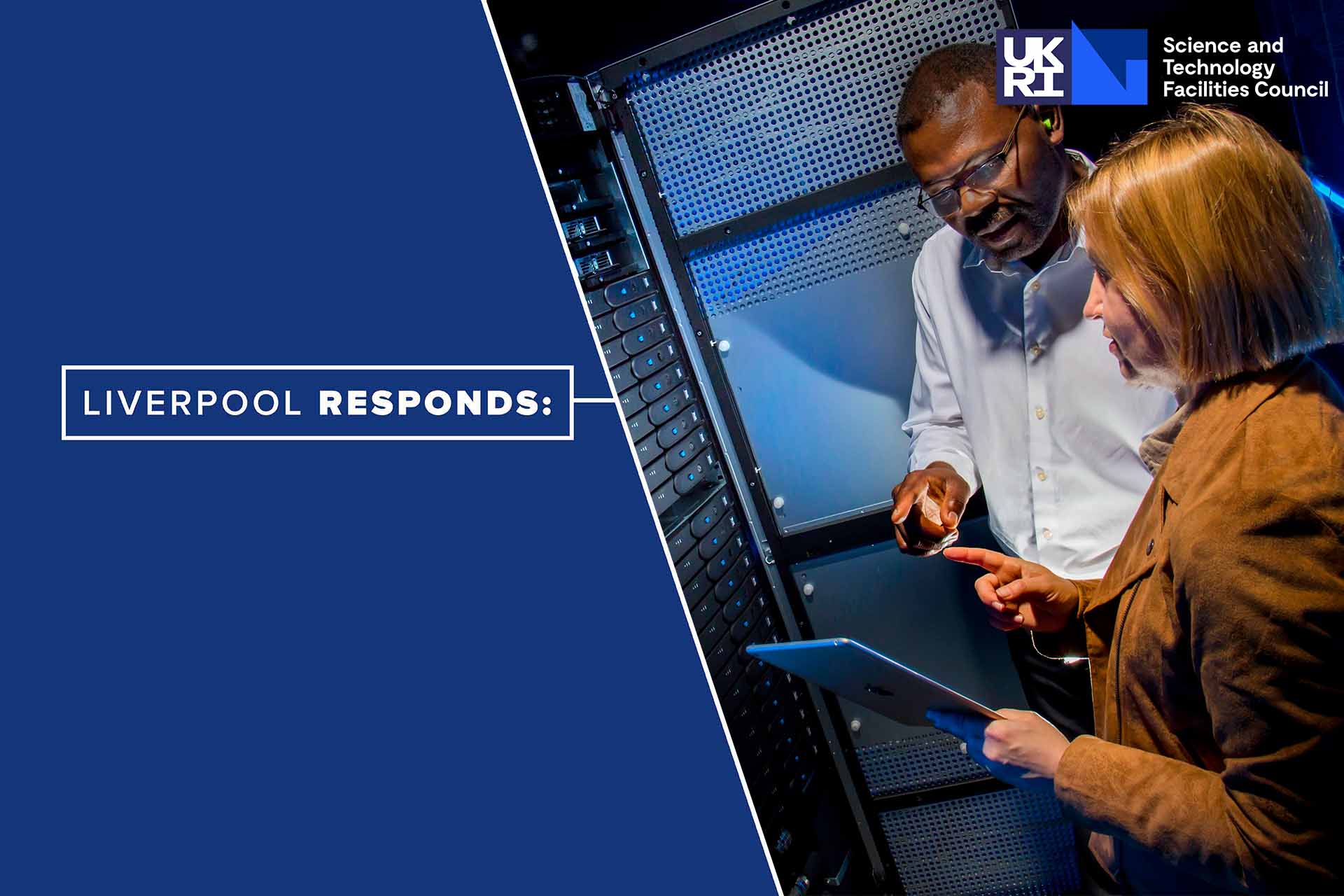This event celebrates the launch of a joint strategy document across the University of Liverpool and UKRI-STFC to deliver a number of collaborations. These are expected to attract jobs & inward investment into the region and establish world-class research & innovation facilities.
This Liverpool Responds event brings together colleagues from different disciplines to explain how the University of Liverpool - UKRI-STFC partnership will:
• Lead the digital transformation
• Attract inward investment for “big-science” programs
• Deliver health technologies
• Boost skills in the region.
A panel discussion co-chaired by Professor Ronan McGrath, Associate Pro-Vice-Chancellor - Infrastructure and Partnerships, Faculty of Science and Engineering, University of Liverpool and Dr Massimo Noro, Business Development Director, Science and Technology, UKRI-STFC, followed by concluding remarks from Mark Basnett, Managing Director of Growth Platform - Liverpool City Region Growth Company.
Panellists include:
Alison Kennedy is the Director of the Science and Technology Facilities Council (STFC) Hartree Centre, based at the UK’s STFC Daresbury Laboratory. The Hartree Centre is backed by over £170 million of government funding and significant strategic partnerships, with a remit to work with companies of all sizes to improve the global competitiveness of UK industry by enabling the adoption of High-Performance Computing (HPC), data analytics and artificial intelligence (AI) technologies and expertise. Prior to joining the Hartree Centre, she was the Executive Director of EPCC, the national HPC Centre based at the University of Edinburgh. Alison began her working life as a real-time systems programmer in industry and has now worked in HPC for almost 25years, managing large collaborative projects in HPC, Data and AI.
Professor Carsten Welsh is the Head of the Physics Department at the University of Liverpool. Professor Welsch studied physics and economics at the Universities of Frankfurt (Germany) and UC Berkeley (USA) and did a PhD in accelerator physics at the University of Frankfurt. After some years as Postdoc at the Max Planck Institute for Nuclear Physics in Heidelberg (Germany, 2003-2004) and as a Fellow at CERN (Switzerland, 2005-2007), he founded the QUASAR Group in 2007 at the University of Liverpool. He is also a member of the Cockcroft Institute of Accelerator Science and Technology and has been Head of the Physics Department since September 2016.
Professor Iain Buchan is Chair in Public Health and Clinical Informatics at the University of Liverpool. Iain Buchan is a public health, informatics and data science research leader. He leads Liverpool's Institute of Population Health and pursues data-intensive public health research for major societal challenges, most recently the SARS-CoV-2 pandemic and COVID-19 responses. He holds a Chair in Public Health and Clinical informatics and is Executive Dean of the Institute of Population Health. He is a Fellow of the American College of Medical Informatics, Faculty of Public Health, Royal Statistical Society, British Computer Society and Faculty of Clinical Informatics, and is NIHR Senior Investigator.
Dr Katharine Robertson is Head of Campus Development at Daresbury (UKRI-STFC) Katharine’s academic background is in Physics, and she completed a PhD in particle physics at the University of Liverpool in 2007. Since graduating, Katharine has worked for the Science and Technology Facilities Council (STFC) in roles in Programme Management, Impact Evaluation, Business Development in the area of particle accelerator science and technology, and now Campus Development. She is based at STFC’s Daresbury Laboratory on the Sci-Tech Daresbury campus, which is home to an ever-expanding community of nearly 150 technology-focused businesses. Her role is to work with partners on and off-campus to help steer the strategy for the site as it grows, to raise its profile, and to maximise the benefit of the campus to the region and the wider UK.
Back to: Webcasts
